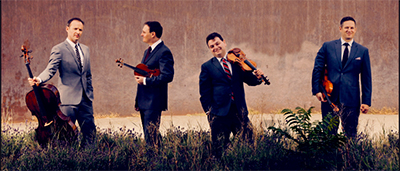by Mike Telin

On Tuesday, October 2 at 7:30 pm at Plymouth Church in Shaker Heights, the Cleveland Chamber Music Society will inaugurate their new season with a return visit by the Jerusalem Quartet — Alexander Pavlovsky and Sergei Bresler, violins, Ori Kam, viola, and Kyril Zlotnikov, cello. The program includes Beethoven’s Quartet in a, Op. 18, No. 5, Ravel’s Quartet in F, and Shostakovich’s Quartet No. 3 in F, Op. 73. CWRU professor David J. Rothenberg will give a pre-concert lecture beginning at 6:30. Tickets are available online.
Tuesday’s concert will mark the Quartet’s fifth appearance on the CCMS series since 2010 — the last was in March of 2017. Looking back at that 2015 interview, we thought it would be nice to re-share some of Alexander Pavlovsky’s responses to questions he graciously agreed to answer by email.
Mike Telin: How do you choose your programs? Is it a group decision?
Alexander Pavlovsky: The string quartet repertoire is amazing and endless. One life is too short to explore it all. From the beginning, we have tried to cover as much as we can, from the very first opuses of “Papa” Haydn to the modern music of the 20th and 21st centuries, including opuses written especially for us. Our feeling is that the public also finds this variety, as in our Cleveland program, successful and entertaining. We always try to offer our audience this kind of variety. Unless we make a special project, like a cycle of Brahms, Shostakovich, or Bartók, or focus only on music of the 20th century, for example. And of course, it is a group decision.
MT: The Quartet has made many wonderful recordings: how do you think recordings advance the career of an artist or ensemble?
AP: First of all, we are very lucky to have such a long relationship with the Harmonia Mundi label. At a time when the recording business is so weak and problematic, we have an opportunity to record an album or two every year. Second, the recording process is also a very special experience. We learn a lot from every recording session and have long-term ideas for the future.
MT: Pursuing a career in chamber music is a risk: why did you decide to take that risk?
AP: Well, in our special case when we started to play together in high school about the age of 16, there was no place for risk. We were chosen by school direction and our first teacher, Avi Abramovich, who gave us such a wonderful base. We did not think a lot about the future. We were concentrating on building a repertoire and enjoying every moment of being part of such an amazing ensemble. Our goal was to find the right balance between sounding like one 16-stringed instrument while preserving the individuality and personality of each member.
MT: What advice do you give to young musicians who say that they want to pursue a career in chamber music?
AP: Start playing chamber music as early as possible. It gives an additional perspective on the performing process and helps and enriches everyone, whether orchestra player or soloist. The most important thing is to learn how to listen to each other and react.
The Cleveland Chamber Music Society season will continue on Tuesday, October 23, 7:30 pm at Forest Hills Presbyterian Church when baritone Holger Falk and pianist Julius Drake perform songs by Schubert, Eisler, Poulenc, and Satie. The Ehnes Quartet — James Ehnes and Amy Schwartz Moretti, violins, Richard O’Neill, viola, and Edward Arron, cello will present works by Haydn, Elgar, and Bartók on Tuesday, November 13 at 7:30 pm at Plymouth Church in Shaker Heights. The 2018 portion of the season will conclude on Tuesday, November 27 at 7:30 at Plymouth Church when the Juilliard String Quartet performs music by Beethoven, Dvořák, and a new work by Lembit Beecher.
Published on ClevelandClassical.com September 25, 2018.
Click here for a printable copy of this article



